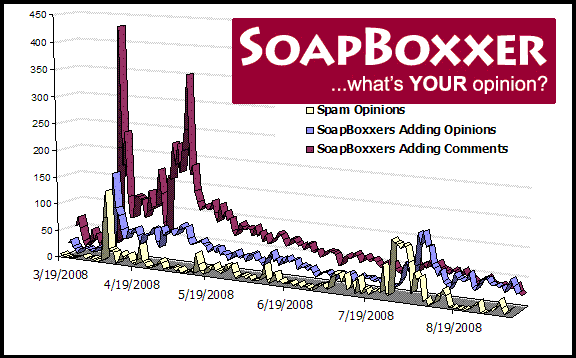Appliance Parts
- Accessories
- Dishwasher
- Dryer
- Stove / Oven
- Microwave
- Refrigerator
- Washer
- See more... See less...
Lawn Equipment Parts
- Lawn Mower
- Chainsaw
- Blower
- Generator
- Air Compressor
- Lawn Tractor
- Pressure Washer
- See more... See less...
SoapBoxxer.com – The End to an Experiment in Social Networking
We have decided to shut down our social networking site, SoapBoxxer.com - it has been taken down and redirected here. Let me take a few moments to explain how SB came to be, what went right and what went wrong, and how we came to the decision that it was time to end the project.
An experiment in engagement
On March 6th, 2008 an email was sent within the team...
I was thinking tonight about how users engage with content and what makes a site sticky. If you think about it often the best thing about a piece of content is not the content itself but the discussion that ensues. Amazon's reviews, for example, are usually more interesting than the actual product, and the comments at Digg/Slashdot etc. are often more engaging than the story itself. What if you were able to create a site where the content was the discussion and the content by its nature incited debate?
Now, we're an ecommerce company, and so we constantly work to improve the site and the interaction rates of our customers. Unfortunately, appliance parts aren't always something that grab's the user's attention. We help thousands of people every day, but very few of them interact with the site in a social way. SoapBoxxer was an attempt to create something that really engages its users, to see if we could learn something about the way users want to interact with a site and with each other. Of course, if SoapBoxxer became the next Digg we wouldn't exactly complain.,
The SoapBoxxer project also fit well into some work that our development team was doing – learning Ruby on Rails.
Developing SoapBoxxer in Ruby on Rails
We're a Dot Net development shop, but we're intrigued by the potential in rapid application development, and in RoR in particular. As an example of the speed at which you can develop in Rails we had the first version of SoapBoxxer out and in the wild on March 10th, just two business days after the conversation started.
We were able to pull together a mock-up of SB in such a short time because of Rails and because we cut a few corners. The initial version had no user accounts, no sessions, nothing. If the user took the time to refresh the page they could vote again (many did).

Everyone who came to the page was greeted with an opinion and giant links that said "Agree" and "Disagree". Once they registered their vote they could see the voting results and the comment section opened up so they could read the comments of others or add their own. They could also enter some text in the opinion box in the header and create their own opinion for others to vote on.
- Still, the rudimentary system had some amazing results:
- Visits: 1,972
- Interactions (votes, comments, new opinions): 3,000
- Interaction Rate: 152%
- Votes: 2,730
- Vote Rate: 138%
- Comments: 226
- Comment Rate: 11.4%
- Opinions: 61
- Opinion Rate: 3%
We were really excited when these first numbers came in. It proved that if given the opportunity users would produce lots of great content – all you have to do is get out of their way by providing a simple way to do it.
From there, the site just sort of took off. We redeveloped it somewhat properly in RoR, launched it and allowed the users to make it into whatever they wanted. Along the way we learned a few things.
What we learned
- Users will interact if it's easy
- The world is full of thoughtful users with reasoned opinions
- The world is full of trolls, spammers, bigots and narrow-minded partisans
- The community will control spam if given the tools
- Every loophole will be exploited
- Social networks must grow to survive
Users will interact if it's easy
Our first version of SoapBoxxer was completely stripped down – all it had was an opinion, agree and disagree links, and the option to add an opinion in the header. From the first 2,000 visitors to this simple version we had:
- 2,730 votes cast (1.37 / visit)
- 226 comments (.113 / visit)
- 61 soapboxxes (.031 / visit)
- Eventually we got these interaction rates to a staggering level:
- Vote 42.5%
- Comment 5.6%
- Create soapboxx 0.9%
- Join 1.7%
So, 42.5% of users who came to us through a site like StumbleUpon or from a friend's email would vote. 1.7% joined, even though there was no need to join in order to interact – they opted in to joining.
The world is full of thoughtful users with reasoned opinions
I, personally, was constantly amazed at the level of discourse at SoapBoxxer. My favorite soapboxx of all time was an early one – "SoapBoxxer has changed my views on a lot of subjects through discussion". When we originally discussed the idea I secretly feared that it would end up as a platform for flame wars, but that was not the case. In fact, the majority of soapboxxers were surprisingly reasonable.
The world is full of trolls, spammers, bigots and narrow-minded partisans
I won't get into the details here`, but you'll have to trust me on this – some people like to ruin things for other people. I don't know exactly why they want to do it, but they do. And I'm not talking about tugging the pigtails of a girl they like so they'll get noticed. No, there are people that will silently and anonymously attempt to destroy what other people are working on with no apparent gain. Any social network needs tools to control these people.

You can see that even though there was a fair bit of spam, there was far more wheat than chaff.
The community will control spam if given the tools
We gave users the ability to flag items as spam, and they used it effectively. We were concerned that there would be abuse but generally there was none (eventually there was abuse, but only for manipulating authority). We contemplated allowing users to ban other users (it would have come in handy, see above) but decided it would turn SoapBoxxer into a police state. We did restrict spam flagging to users with a minimum authority, as we felt that the longer you'd been around, the less likely you were to trash the place. It did seem to work.
Every loophole will be exploited
When we devised the authority system it was intended as a way for users to identify who was a helpful, long-term user, and who was just a random spammer. It immediately became a subject of great debate. Most people denied its importance, quietly worked at increasing theirs, then gloated when they displaced another SoapBoxxer. My favorite quote came soon after the introduction of authority: "I just spent my entire evening/morning/lunch break on soapboxxer for this pointless 'authority'"
Eventually, users figured out that they best way to win authority was destroying the authority of others. Bots were written to grow authority or trash others. We were always open about what generated authority (every action that affected anyone's authority was quantified as you did it) but still people weren't always happy and many conspiracy theorists debated the ins and outs of authority.
Social networks must grow to survive
This is not something that we necessarily "learned" but an important point that can't be ignored. We tried everything to grow SoapBoxxer. Early on (the first spike in the chart) we got onto Digg. Unfortunately, the site wasn't able to handle the load and we went down. While we gained some new users before the failure (and they were particularly likely to interact) it just wasn't enough. We were never able to get featured prominently on Digg again, despite several attempts – it seems you only get one kick at that cat.
We always felt that a social network must grow from the users, not from artificial means like getting on the Digg home page or from StumbleUpon. We focused on user invitations as a means for growing our network, and while we had some success it was never able to exceed attrition. What we found is that while Facebook is about interacting with your real-world friends online SoapBoxxer was about interacting with strangers in a new environment. An oft-repeated sentiment was that people wouldn't want their friends on SoapBoxxer because it would strip away their anonymity.
In the end, it has become clear that SoapBoxxer will not grow on its own. Certainly, it would never make any money - even if we added advertising the revenue would be insignificant. SoapBoxxer was an experiment, and like all experiments it must come to an end. To our dedicated users, thank you for your interest and good luck.
- Search your model number to find:
- Genuine OEM parts guaranteed to fit
- Free manuals and guides
- Repair instructions and videos

































